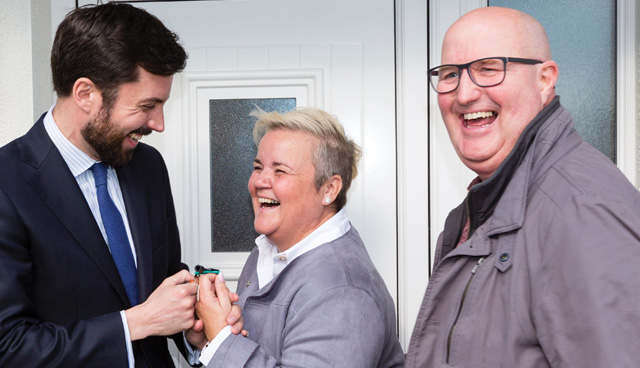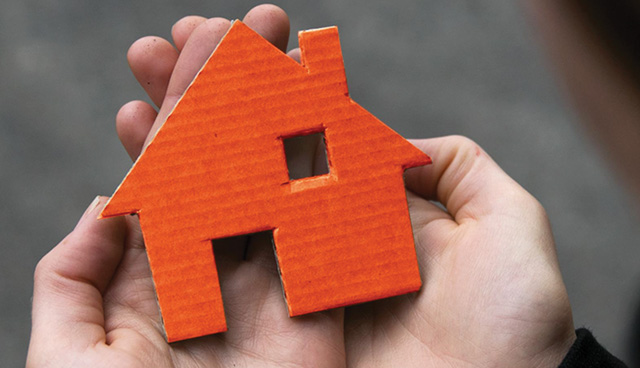
Housing First programme
17th May 2019
Housing Agency’s Second Strategic Plan
17th May 2019Reversing reclassification to deliver more homes

Chief Executive of Clúid Housing, Brian O’Gorman, speaking at the Mansion House at a recent event hosted by the Lord Mayor to mark Clúid’s 25th anniversary.

Chief Executive of Clúid Housing, Brian O’Gorman, speaking at the Mansion House at a recent event hosted by the Lord Mayor to mark Clúid’s 25th anniversary.
Clúid Housing is 25 years in existence this year. In that time, the organisation has built up its reputation and housing stock to become the largest Approved Housing Body (AHB) in Ireland, with over 17,000 people now living in a home either owned or managed by Clúid, writes Chief Executive Brian O’Gorman.
In recent years, Clúid has partnered with five other approved housing bodies (AHBs) – Circle Voluntary Housing, Cooperative Housing Ireland, Oaklee Housing, Respond and Tuath Housing – to form the Housing Alliance. As large general needs housing organisations, with national remits, we work collaboratively to promote practical and innovative solutions for the enhanced development and management of social and affordable housing in Ireland.
Local authorities are the largest provider of social housing, but AHBs play an increasingly important role, with responsibility for approximately 30,000 homes. The six AHBs of the Housing Alliance are responsible for over 20,000 of these tenancies nationwide, that’s two-thirds of the total AHB housing stock in Ireland. The current government target for social housing output is 50,000 additional homes by 2021. It is expected that AHBs will deliver one third of that figure, representing a major contribution to social housing output at a time when our country is experiencing an unprecedented shortage.
In December 2017, at the request of the European Statistics Agency (Eurostat), the Central Statistics Office (CSO) provided an assessment note on the sector classification of the 15 largest AHBs in the country. Following assessment, the CSO felt that 14 of these larger AHBs (all Tier-3) should be reclassified from non-profit institutions serving households (NPISH), to the general government sector as defined in European System of Accounts 2010 (ESA 2010).
In essence, the CSO’s recommendation was that these larger AHBs, which were off-balance sheet, should be classified as being on the government’s balance sheet. In February 2018, Eurostat supported this recommendation. Clúid Housing, along with our counterparts in the Housing Alliance, is affected by this decision.
The Housing Alliance sees the reclassification of AHBs as the most significant issue to hit the sector in many years and has warned the government both before and after this decision was made that it will directly impinge on AHBs’ ability to build social housing.
Classifying AHBs as on-balance sheet means that AHB expenditure will contribute to general government debt. More importantly though, classifying AHB spending as government spending means it will have to compete with others for the expenditure available in that fiscal space. In other words, while we’re classified as on-balance sheet we’re competing with other public services, such as hospitals and Garda stations, for the same amount of government funding. It is highly likely that this will result in less money being available for AHBs, with an obvious consequential reduction in social housing output. This, in turn, could threaten Rebuilding Ireland’s ambitious delivery targets.
It is vitally important that we maintain and protect the contribution of AHBs during this time of change. AHBs are independent non-profit civil society organisations. The contribution of AHBs, such as the Iveagh Trust, predate the foundation of the Irish state. AHBs, alongside other civil society organisations such as credit unions, form an essential component of the strata of Irish society. This independence is compromised by Eurostat’s reclassification.
Clúid welcomes statements from Eoghan Murphy T.D., Minister for Housing, Planning and Local Government, which emphasise the Government’s continuing support for the AHB sector and his desire to see the reversal of reclassification. It was equally reassuring to hear Minister for Housing and Urban Renewal, Damien English TD, say at the Public Affairs Ireland conference on Social Housing last year that he and Minister Murphy hold the AHB sector in the highest esteem. On the issue of reclassification, his message to AHBs was: “It is a balance sheet issue, an issue for the Government to tackle, it should not impact you. Do not limit your ambition.”
The Housing Alliance has been working alongside our colleagues in the Irish Council for Social Housing (ICSH) to identify the changes that will see the decision to reclassify reversed. It is our understanding that the changes required are possible and within the ability of housing associations and Government to bring about. The changes required to finance, administration and regulation are eminently deliverable.

Ger and Debbie Kearney getting the keys to their new home at Sleaty Park View, a Clúid Housing scheme in Carlow, from Minister Eoghan Murphy.
“It is highly likely that reclassification will result in less money being available for AHBs, with an obvious consequential reduction in social housing output. This, in turn, could threaten Rebuilding Ireland’s ambitious delivery targets.”
It is worth noting that there is a recent precedent for this process. In the UK, housing associations were reclassified to the general government sector in 2015. Two years later, following structural changes made to the relationship between housing associations and Government, housing associations were reclassified as private bodies. Although the reasons for reclassification in the UK were different from the reasons given in Ireland, the UK experience demonstrates that a collaborative effort, involving Government, the housing regulator, and non-profit housing bodies, made possible the changes required for reclassification.
Clúid believes very strongly that AHBs have made a huge contribution to the development and management of high-quality social housing, and are on course to play a major role in the delivery of government targets for social housing as set out in Rebuilding Ireland.
The issue of reclassification hangs like a heavy cloud over the AHB sector at present, and we sincerely urge the government to bring about its swift resolution. Clúid is honoured to be playing a part in the government’s ambitious social housing delivery programme. We are committed to continuing to provide quality housing and services to enable people to create homes and thriving communities, but fear that unless the reversal of reclassification takes place, we will be unable to meet our targets for social housing provision. The decision to reclassify is now over a year ago yet there is little evidence that this issue is being addressed. The AHBs have indicated their strong desire to work with Government to resolve this issue, but as the UK precedent has shown, it requires a similar application by Government.
Brian O’Gorman, Chief Executive
Clúid Housing
T: 01 707 2088
E: cluid@cluid.ie
W: www.cluid.ie







